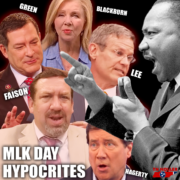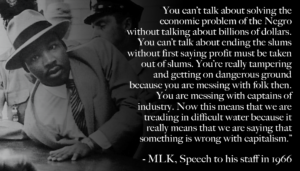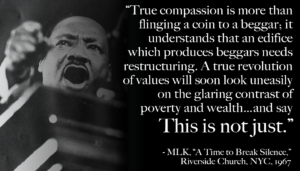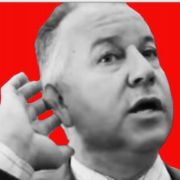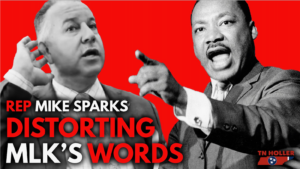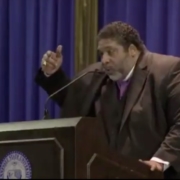REP. TIM RUDD VS. MLK’S POOR PEOPLE’S CAMPAIGN
With Martin Luther King Jr. Day approaching this weekend, Representative London Lamar (D-Memphis) introduced a resolution honoring him at the Tennessee legislature today. One would think a resolution honoring a man every Republican will claim to appreciate come Monday would sail through – but this being Tennessee, you would be wrong.
Rep. Tim Rudd (R-Murfreesboro) objected to some of the language in the resolution – specifically the language that talked about the Poor People’s Campaign, which Reverend Dr. William Barber now leads to continue the work of Dr. King.
You can read the initial draft of the Lamar resolution HERE.
And the adjusted version HERE.
Both versions include many facts and statistics about poverty in America, and Tennessee specifically, including the fact that 19.5 percent of Black people in the U.S. live in poverty, that Black Americans had the highest rate of poverty across the racial groups, and that Tennessee has one of the highest poverty rates in America.
Below is the language that was removed because Rep. Rudd objected to it – keep in mind Tennessee Republicans also blocked a resolution honoring Dr. Barber not long ago. (Here’s our interview with Dr. Barber, who is a great man, and who is fighting as hard for America’s poor as anyone).
WHEREAS, in order to observe, reflect, and celebrate the fullness of Reverend Dr. Martin Luther King, Jr.’s legacy, we must take up and reckon with Dr. King’s rejection of the economic status quo and his shift toward economic justice in the later years of his life; and
WHEREAS, Dr. King believed that without economic justice it would be impossible to achieve the full citizenship that was promised to all marginalized people by the passage of the 1964 Civil Rights Act; and
WHEREAS, Dr. King, Marion Wright, and the SCLC launched the Poor People’s Campaign as the beginning of a new co-operation, an understanding, and a determination by poor people of all colors and backgrounds to assert and win their right to a decent life and respect for their culture and dignity; and
WHEREAS, at the Campaign’s conception, Dr. King sought to organize 2,000 poor people to go to Washington, D.C., southern states, and northern cities to meet with government officials to demand jobs, unemployment insurance, a fair minimum wage, and education for poor adults and children; and
WHEREAS, on May 12, 1968, roughly one month after the assassination of Dr. King, his widow, Coretta Scott King, led thousands of women to activate the Poor People’s Campaign. On May 13, 1968, Resurrection City was erected on the National Mall in Washington, D.C., and – 3 – 011285 over the course of the next month, demonstrators outlasted the staggering heat to demand economic opportunity at different federal agencies; and
WHEREAS, as a result of the 1968 leg of the Poor People’s Campaign, 200 counties received free surplus food distribution, and some federal agencies agreed to hire poor people to lead poverty programs; and
WHEREAS, the Poor People’s Campaign continues today, advocating for its Declaration of Rights and the Poor People’s Moral Agenda, which tackles systemic racism, poverty and inequality, ecological devastation, national morality, and war economy and militarism; and
WHEREAS, according to the Institute for Economic and Racial Equity at the The Heller School for Social Policy and Management at Brandeis University, “policy drives the racial wealth gap.” This means that “policy changes rather than behavioral changes” are the key in closing the wealth gap across racial groups. As legislators who craft state policy, legislators must ensure that the policies they create do not exacerbate but rather work to shrink the existing disparities; and
WHEREAS, the COVID-19 pandemic amplified and worsened the existing wealth inequalities across racial groups; and
WHEREAS, Dr. King’s economic justice work remains unfinished today. State legislatures must commit to and reaffirm their commitment to manifesting and actualizing the fullness of Dr. King’s dream; and
As a reminder, here’s Rev. Dr. Barber calling out Governor Lee to his face on MLK Day a few years back. One of our favorite clips ever:
WATCH: “Politicians can’t say they love Dr. King, and how he stood for love & unity… but then refuse to support his agenda. RIGHT GOVERNOR?”
2019, NASHVILLE — @RevDrBarber calls out @GovBillLee and his party of hypocrites TO HIS FACE.🔥🔥 #MLKDay pic.twitter.com/bSzTibwrAG
— The Tennessee Holler (@TheTNHoller) January 18, 2021



